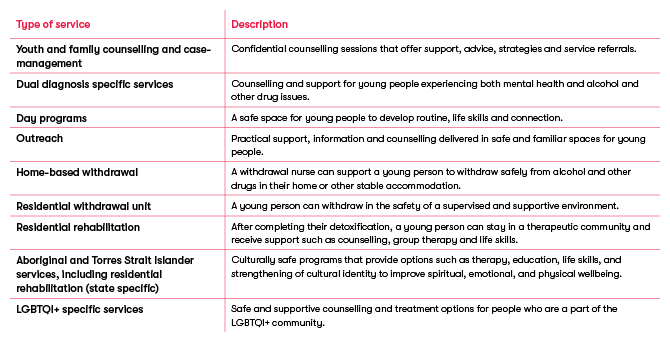July 26, 2021
Treatment and support for young people

We know young people go through intense physical and social changes during adolescence. And, this can also be a time when some young people experiment with alcohol and other drugs.1
It’s important to remember that experimentation doesn’t always lead to dependence, and not all alcohol or drug use requires help or treatment.
There are many reasons why a young person might use alcohol or drugs.
Some young people are beginning to experiment. Others might only use alcohol or other drugs when they are socialising. Some use to cope with stressful situations, or they may be dependent and use to alleviate physical or emotional pain to feel ‘normal’.
If you or a young person in your life is concerned about their alcohol or drug use, support options are available.
Here’s how to get started.
Keep talking
One of the best ways to help a young person make safer choices about their alcohol or other drug use is by talking to them.2
Providing young people with the facts and having open, honest and non-judgemental conversations about alcohol and other drugs can build trust and help you understand why they may be using them.2
Equipping young people with information about the risks and harms associated with alcohol or drug use and providing them with practical ways to reduce these harms, can help keep them safer.3
These conversations aren’t always easy but there’s some great advice out there for parents and carers:
- Positive Choices provides information on how to talk with young people, the warning signs for dependence, and how to help someone who has taken a drug.
- YSAS has information for parents and carers on supporting a young person, communication strategies, and understanding support and treatment services.
- The Other Talk is a resource that can help you prepare for a conversation on alcohol and other drugs with a young person.
- You can also contact Parentline to speak to someone over the phone. It’s a service run by qualified counsellors who can listen to your experiences, provide guidance on how to navigate situations, and work out ways to help create change.
Get some help
If a young person’s alcohol or other drug use is impacting their relationships, home, work, or school life, there are services that can help.
In fact, there are lots of different options for support available.
Drug and alcohol services will work with young people to:
- identify and work towards their goals in relation to their alcohol or drug use
- reduce alcohol and drug-related harms
- identify additional needs - such as mental and physical health, family, education, employment and housing support - and help the young person access support in these areas.4
These youth services include5:

Find support and treatment options
If a young person would like to reduce or stop their use, you can:
- help them access a youth-focused service like headspace. headspace is the national youth mental health service, supporting young people (12-25 years) to address issues relating to mental health, physical health (including sexual health), work and study support and alcohol and other drugs. Most headspace centres have dedicated youth drug and alcohol counsellors. A young person can access ‘face to face’ counselling at headspace centres or e-counselling. For a headspace centre near you, check out the locations map here. Phone: 1800 650 890
- Talk with your GP, local community health centre, or youth council service to find out what drug treatment services are available in your area
- Alternatively, you can contact the National Alcohol and other Drug Hotline on 1800 250 015.
This phone line can provide you with comprehensive information, counselling, advice, and referrals for any alcohol or other drug related inquiry. They can also direct you to a youth alcohol and other drug service in your area – they’re open 24/7.
Remember, if the service you access isn’t the right fit for the young person you’re concerned about, keep trying.
There are great youth organisations across Australia providing different options to suit different needs. You can always ask for another clinician or go back to your referral source to find a service that may be a better fit.
- Stone AL, Becker LG, Huber AM, Catalano RF. Review of risk and protective factors of substance use and problem use in emerging adulthood. Addictive Behaviors. 2012;37(7):747-75.
- Positive Choices. Talking to a young person about alcohol and other drugs: Positive Choices; 2021. [cited 28 June 2021].
- Youth Support and Advocacy Service. Supporting a young person (who is using drugs or alcohol): YSAS; 2021 [cited 28 June 2021].
- Youth Support and Advocacy Service. Understanding Support Services and Treatment: YSAS; 2021. [cited 28 June 2021].
- Youth Support and Advocacy Service. Drug & Alcohol: YSAS; 2021. [cited 28 June 2021].


